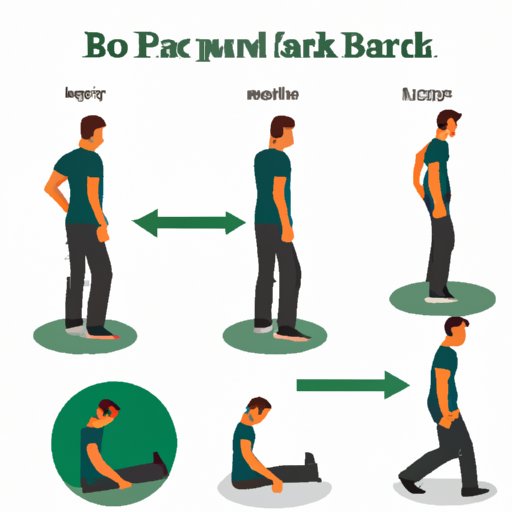
Introduction
Lower back pain is a common ailment affecting people of all ages and lifestyles. It can be caused by a variety of factors such as poor posture, muscle strain, or herniated discs. The pain can range from mild discomfort to a debilitating condition that affects one’s quality of life. The purpose of this article is to provide an overview of the best treatment options for lower back pain, including immediate relief, natural remedies, safe exercises, prevention and management strategies, and medication.
Immediate and Long-term Relief
The first step in treating lower back pain is often painkillers, muscle relaxants, physical therapy, or in severe cases, surgery. Painkillers such as ibuprofen and acetaminophen can provide temporary relief from pain, while muscle relaxants can help reduce muscle spasms. Physical therapy aims to improve mobility and strengthen the muscles surrounding the lower back, while surgery may be necessary for cases when other treatments are ineffective. Studies have shown that these treatment options can provide both immediate and long-term relief. For instance, a study published in the Annals of Internal Medicine found that physical therapy was more effective than medication alone in reducing lower back pain and improving function.
Natural Remedies vs Medical Interventions
Natural remedies such as yoga, massage, and acupuncture are also gaining popularity as effective treatments for lower back pain. Each approach has its pros and cons compared to conventional medical interventions. Natural remedies can be less invasive and have fewer side effects than medication or surgery. However, natural remedies may not be the best solution for everyone and might not provide immediate relief. Stress reduction techniques such as meditation can also be helpful in managing lower back pain by reducing the body’s stress hormone levels. When considering natural remedies, it’s important to find a reputable practitioner and be willing to experiment with different modalities to find what works best for you.
Safe Exercises for Lower Back Pain
Exercise can be a powerful tool for managing lower back pain, particularly exercises that focus on stretching and strengthening the muscles in and around the lower back. Some of the safest exercises include yoga, Pilates, and swimming, as they are low-impact and put less strain on the lower back. However, it’s essential to take proper precautions and work with a qualified instructor to ensure correct form and technique. Modifications should be made according to one’s age, pain level, and fitness level. It’s also important to listen to your body and not overdo it as this could cause more damage.
Prevention and Management Strategies
Prevention is a key aspect of managing lower back pain and involves adopting healthy habits. Some strategies for prevention include maintaining a healthy weight, engaging in regular exercise, practicing proper posture, and taking breaks regularly if you have a job that requires long hours of sitting or standing. Stress reduction techniques like mindfulness, meditation, and deep breathing can also help manage lower back pain by reducing muscle tension. Ergonomic adjustments can be made in the workplace and at home to reduce the likelihood of developing lower back pain.
Medications for Lower Back Pain
Medications are often an essential part of treating lower back pain, and there are different medications available depending on the severity of the pain. Nonsteroidal anti-inflammatory drugs (NSAIDs) like aspirin and ibuprofen can reduce inflammation and pain, while opioids such as hydrocodone and oxycodone can provide relief for severe pain. However, opioids carry a risk of addiction and other side effects, so they must be used with caution and only under a doctor’s guidance. Muscle relaxants like cyclobenzaprine can also be used to reduce spasms. It’s important to discuss treatment options and any side effects with a healthcare professional and follow the prescribed plan carefully.
Conclusion
Lower back pain can be a debilitating condition that affects one’s quality of life. There are various treatment options available, including immediate relief, natural remedies, safe exercises, prevention and management strategies, and medication. It’s essential to discuss treatment options with a healthcare professional and stay motivated to make lifestyle changes necessary to treat and prevent future episodes of lower back pain. Taking an active role in managing lower back pain can improve one’s well-being and make daily activities more enjoyable.





